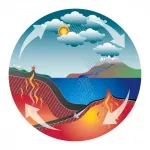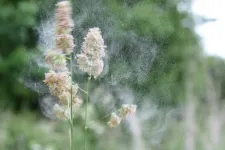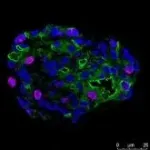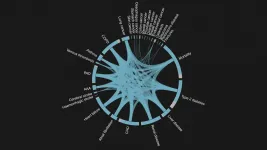How the habitability of exoplanets is influenced by their rocks
2021-03-11
(Press-News.org) The conditions on Earth are ideal for life. Most places on our planet are neither too hot nor too cold and offer liquid water. These and other requirements for life, however, delicately depend on the right composition of the atmosphere. Too little or too much of certain gases - like carbon dioxide - and Earth could become a ball of ice or turn into a pressure cooker. When scientists look for potentially habitable planets, a key component is therefore their atmosphere.
Sometimes, that atmosphere is primitive and largely consists of the gases that were around when the planet formed - as is the case for Jupiter and Saturn. On terrestrial planets like Mars, Venus or Earth, however, such primitive atmospheres are lost. Instead, their remaining atmospheres are strongly influenced by surface geochemistry. Processes like the weathering of rocks alter the composition the atmosphere and thereby influence the habitability of the planet.
How exactly this works, especially under conditions very different from those on Earth, is what a team of scientists, led by Kaustubh Hakim of the Centre for Space and Habitability (CSH) at the University of Bern and the NCCR PlanetS, investigated. Their results were published today in The Planetary Science Journal.
Conditions are decisive
"We want to understand how the chemical reactions between the atmosphere and the surface of planets change the composition of the atmosphere. On Earth, this process - the weathering of silicate rocks assisted by water - helps to maintain a temperate climate over long periods of time", Hakim explains. "When the concentration of CO2 increases, temperatures also rise because of its greenhouse effect. Higher temperatures lead to more intense rainfall. Silicate weathering rates increase, which in turn reduce the CO2 concentration and subsequently lower the temperature", says the researcher.
However, it need not necessarily work the same way on other planets. Using computer simulations, the team tested how different conditions affect the weathering process. For example, they found that even in very arid climates, weathering can be more intense than on Earth if the chemical reactions occur sufficiently quickly. Rock types, too, influence the process and can lead to very different weathering rates according to Hakim. The team also found that at temperatures of around 70°C, contrary to popular theory, silicate weathering rates can decrease with rising temperatures. "This shows that for planets with very different conditions than on Earth, weathering could play very different roles", Hakim says.
Implications for habitability and life detection
If astronomers ever find a habitable world, it will likely be in what they call the habitable zone. This zone is the area around a star, where the dose of radiation would allow water to be liquid. In the solar system, this zone roughly lies between Mars and Venus.
"Geochemistry has a profound impact on the habitability of planets in the habitable zone", study co-author and professor of astronomy and planetary sciences at the University of Bern and member of the NCCR PlanetS, Kevin Heng, points out. As the team's results indicate, increasing temperatures could reduce weathering and its balancing effect on other planets. What would potentially be a habitable world could turn out to be a hellish greenhouse instead.
As Heng further explains, understanding geochemical processes under different conditions is not only important to estimate the potential for life, but also for its detection. "Unless we have some idea of the results of geochemical processes under varying conditions, we will not be able to tell whether bio-signatures - possible hints of life like the Phosphine that was found on Venus last year - indeed come from biological activity", the researcher concludes.
INFORMATION:
Center for Space and Habitability (CSH)
The mission of the Center for Space and Habitability (CSH) is to foster dialogue and interactions between the various scientific disciplines interested in the formation, detection and characterization of other worlds within and beyond the Solar System, the search for life elsewhere in the Universe, and its implications for disciplines outside of the sciences. The members, affiliates and collaborators include astronomers, astrophysicists and astrochemists, atmospheric, climate and planetary scientists, geologists and geophysicists, biochemists and philosophers. The CSH is home to the CSH and Bernoulli Fellowships, which host young, dynamic and talented researchers from all over the world to conduct independent research. It actively run a series of programs to stimulate interdisciplinary research within the University of Bern including collaborations and/or open dialogue with Medicine, Philosophy and Theology. The CSH has an active tie to the Centre for Exoplanets & Habitability of the University of Warwick. It is active in implementing gender equality measures and public outreach.
More information: http://www.csh.unibe.ch
Bernese space exploration: With the world's elite since the first moon landing
When the second man, "Buzz" Aldrin, stepped out of the lunar module on July 21, 1969, the first task he did was to set up the Bernese Solar Wind Composition experiment (SWC) also known as the "solar wind sail" by planting it in the ground of the moon, even before the American flag. This experiment, which was planned and the results analyzed by Prof. Dr. Johannes Geiss and his team from the Physics Institute of the University of Bern, was the first great highlight in the history of Bernese space exploration.
Ever since Bernese space exploration has been among the world's elite. The numbers are impressive: 25 times were instruments flown into the upper atmosphere and ionosphere using rockets (1967-1993), 9 times into the stratosphere with balloon flights (1991-2008), over 30 instruments were flown on space probes, and with CHEOPS the University of Bern shares responsibility with ESA for a whole mission.
The successful work of the Department of Space Research and Planetary Sciences (WP) from the Physics Institute of the University of Bern was consolidated by the foundation of a university competence center, the Center for Space and Habitability (CSH). The Swiss National Fund also awarded the University of Bern the National Center of Competence in Research (NCCR) PlanetS, which it manages together with the University of Geneva.
[Attachments] See images for this press release:

ELSE PRESS RELEASES FROM THIS DATE:
2021-03-11
COLUMBUS, Ohio - Electric stimulation may be able to help blood vessels carry white blood cells and oxygen to wounds, speeding healing, a new study suggests.
The study, published in the Royal Society of Chemistry journal Lab on a Chip, found that steady electrical stimulation generates increased permeability across blood vessels, providing new insight into the ways new blood vessels might grow.
The electrical stimulation provided a constant voltage with an accompanying electric current in the presence of fluid flow. The findings indicate that stimulation increases ...
2021-03-11
Grass pollen is a major outdoor allergen, responsible for widespread and costly respiratory conditions including allergic asthma and hay fever (rhinitis). Now, researchers re-porting in the journal Current Biology on March 11 suggest that environmental DNA could help to better understand which grasses are the worst offenders.
"These findings represent a first step towards changing and improving our understanding of the complex relationships between pollen and population health," said Benedict Wheeler of the University of Exeter, UK. "If confirmed and refined, this research could help to improve pollen forecasts and warnings in the future, supporting individual and community-level prevention strategies and management ...
2021-03-11
Hormones produced by the thyroid gland are essential regulators of organ function. The absence of these hormones either through thyroid dysfunction due to, for example, irradiation, thyroid cancer or autoimmune disease or thyroidectomy leads to symptoms like fatigue, feeling cold, constipation, and weight gain. The condition called hypothyroidism is estimated to affect up to 11% of the global population. Although hypothyroidism can be treated by hormone replacement therapy, some patients have persistent symptoms and/or experience side effects. To investigate potential alternative treatment strategies for these patients, researchers have now for the first time succeeded in generating thyroid mini-organs in the lab. In a END ...
2021-03-11
People often choose the standard option. Choosing to be an organ donor, printing on both sides of the page - such decisions are influenced by which is the standard setting, or default. In fact, economists and sociologists call this the default effect. Researchers at ETH Zurich and the University of Warwick in the UK have now managed to clearly demonstrate this effect. Private households, but also self-employed people and SMEs, are more likely to procure sustainably produced electricity if that is their provider's default offer.
The scientists conclude this from an analysis of data from two Swiss electricity suppliers - one large and one medium-sized. ...
2021-03-11
Researchers studying the Swiss energy market have found that making green energy the default option for consumers leads to an enduring shift to renewables and thus has the potential to cut CO2 emissions by millions of tonnes.
The study, published today in Nature Human Behaviour, investigated the effect of changes in the Swiss energy market that presented energy from renewable sources as the standard option for consumers - the 'green default.'
Both business and private customers largely accepted the default option, even though it was slightly more expensive, and the switch to green sources proved a lasting one.
Professor Ulf Liebe (University of Warwick), Doctor Jennifer Gewinner and Professor em. Andreas Diekmann (both ETH Zurich) analysed data from two Swiss ...
2021-03-11
New research, which brings healthcare data together with ground-breaking ecological techniques, could set a roadmap for refining pollen forecasts in the future.
Current pollen forecasts, crucial for people with allergic asthma or hay fever to manage their symptoms, rely on measuring the total load of grass pollen in the atmosphere. However, these do not distinguish between pollen from different types of grass.
Now, a potential link between pollen from certain grass species and respiratory health issues has been revealed.
The results, published in Current Biology, (11.3.21DOI: 10.1016/j.cub.2021.02.019 ) have been produced by the first project to use an ecological biomonitoring ...
2021-03-11
A new study published today in Nature Medicine has identified key risk factors that increase the likelihood of individuals developing not only one but multiple non-communicable diseases, which include cardiovascular disease, cancer, chronic respiratory disease and diabetes.
The analysis of over 11,000 people found that rather than being due to chance, there are often underlying biological links in individuals with multimorbidity, which is defined as the co-occurrence of two or more long-term health conditions and is a growing public health challenge.
Multimorbidity, which affects about two thirds of people aged 65 years or over in the UK, impairs an individual's quality of life over and above the cumulative burden from each individual disease. Understanding which diseases ...
2021-03-11
A national screening programme targeted at those men who are genetically pre-disposed to prostate cancer, and involving a blood test and MRI scan before an invasive biopsy, could prevent one in six prostate cancer deaths and significantly reduce over-diagnosis, finds a new study led by UCL researchers.
Prostate cancer is the most common form of cancer in men with around 130 new cases diagnosed in the UK every day and more than 10,000 men a year dying as a result of the disease. However, unlike breast and cervical cancer there is currently no national screening programme for this disease in the UK.
Currently, men suspected of having prostate cancer have a blood test that detects raised levels of the prostate-specific antigen (PSA)*. Following the UCL-led ...
2021-03-11
What The Study Did: Experiences of Latinx patients who were hospitalized with and survived COVID-19 are described in this study.
Authors: Lilia Cervantes, M.D., of Denver Health in Colorado, is the corresponding author.
To access the embargoed study: Visit our For The Media website at this link https://media.jamanetwork.com/
(doi:10.1001/jamanetworkopen.2021.0684)
Editor's Note: The article includes funding/support disclosures. Please see the article for additional information, including other authors, author contributions and affiliations, conflict of interest and financial disclosures, and funding and support.
INFORMATION:
Media advisory: The full study and commentary are linked to this news release.
Embed this link to provide ...
2021-03-11
What The Study Did: This randomized clinical trial evaluated the effect on patient perceptions of communication, trust and empathy of surgeons who wore clear masks that showed their faces versus standard masks that obscured them during outpatient clinic visits.
Authors: Muneera R. Kapadia, M.D., M.M.E., of the University of North Carolina at Chapel Hill, is the corresponding author.
To access the embargoed study: Visit our For The Media website at this link https://media.jamanetwork.com/
(doi:10.1001/jamasurg.2021.0836)
Editor's Note: Please see the article for additional information, including other authors, author contributions and affiliations, conflict of interest and financial disclosures, and funding and support.
INFORMATION:
Media advisory: The full ...
LAST 30 PRESS RELEASES:
[Press-News.org] How the habitability of exoplanets is influenced by their rocks



